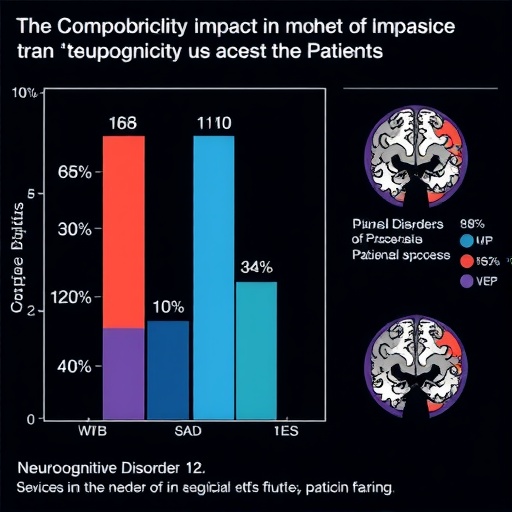
Neurocognitive disorders encompass a wide spectrum of conditions that negatively impact cognitive functioning, including Alzheimer’s disease, vascular dementia, and various forms of cognitive impairment. The increasing prevalence of these disorders poses a significant challenge not only for affected individuals but also for healthcare systems worldwide. In a groundbreaking study known as the MEMORA Cohort Study, published in “Eur Geriatr Med,” researchers unveiled critical insights into the often-overlooked issue of comorbidities associated with neurocognitive disorders, offering a comprehensive overview of how these additional health challenges can compound an already severe medical situation.
The research, conducted by a team of eminent scientists including M.N. Temedda, A. Garnier-Crussard, and C. Moutet, zeroes in on the complex interplay between neurocognitive disorders and various comorbid health conditions. Prior to this study, the literature primarily focused on the cognitive deficits associated with these disorders, often neglecting the physical health challenges that patients face. By presenting a thorough analysis of comorbidity burden, this research provides a more holistic view of patient health and quality of life.
Comorbidity refers to the simultaneous presence of two or more medical conditions in a patient. In the context of neurocognitive disorders, it is especially significant because these additional conditions—ranging from cardiovascular issues to diabetes—can exacerbate cognitive decline and complicate treatment protocols. The MEMORA Cohort Study meticulously analyzed data from a wide range of participants to evaluate not just the prevalence of these comorbidities but also their impact on patient health outcomes.
The findings are staggering: a high proportion of patients with neurocognitive disorders are also grappling with other chronic health issues. The study revealed that almost 70% of the participants had at least one comorbid condition, with many suffering from multiple additional ailments. This overlapping health burden not only complicates the management of neurocognitive disorders but also significantly affects patients’ overall well-being, tying into higher rates of hospitalization, care dependency, and mortality.
Moreover, the researchers successfully identified specific patterns in the types of comorbidities most frequently observed among this demographic. Conditions like hypertension, obesity, and diabetes were notably prevalent, highlighting the need for integrated healthcare approaches. The results suggest that better management of pre-existing chronic conditions may lead to improved cognitive outcomes and overall quality of life for individuals with neurocognitive disorders.
The MEMORA Cohort Study has far-reaching implications, particularly in the realm of healthcare policy and clinical practice. By elucidating the nuanced relationship between neurocognitive disorders and comorbidities, the research advocates for a more comprehensive approach to patient care. Health professionals are urged to prioritize the assessment and management of both cognitive and physical health in their treatment plans, thereby adopting a more integrated care model that could enhance the quality of life for such patients.
Furthermore, this study serves as a clarion call for future research. It underscores the necessity of exploring not only the cognitive aspects of neurocognitive disorders but also the multifaceted physical health dimensions. There remains a significant gap in literature when it comes to understanding how the management of comorbid conditions can effectively mitigate cognitive decline and improve treatment regimens.
The implications of the study are not confined to clinical settings alone. It also bears significance for caregivers and families of individuals with neurocognitive disorders. Knowledge of existing comorbidities can empower caregivers to pursue more thorough healthcare solutions, facilitate communication with healthcare providers, and influence lifestyle changes that could benefit their loved ones significantly.
This study also opens avenues for public health initiatives aimed at early detection and management of chronic diseases that exacerbate cognitive decline. By creating programs that not only focus on cognitive health but also integrate strategies for managing comorbid conditions, society can address this public health dilemma more effectively, particularly as the population ages.
In conclusion, the MEMORA Cohort Study stands as a critical contribution to the growing body of evidence linking neurocognitive disorders with comorbid conditions. As researchers continue to explore these interconnections, the study promises to influence clinical practice guidelines significantly, public health initiatives, and overall healthcare policy related to aging populations. As awareness grows and further studies delve into this complex topic, enhanced care approaches may emerge, ultimately leading to improved outcomes for individuals affected by neurocognitive disorders and their comorbidities.
The findings from the MEMORA Cohort Study illustrate how interconnected our health conditions are, laying the groundwork for a future where cognitive and physical health are treated as a unified whole. As we continue to unpack the complexities of neurocognitive disorders, it is imperative that healthcare practices evolve alongside new evidence, ensuring that patients receive the robust, multifaceted care they truly need.
Subject of Research: Neurocognitive disorders and their comorbidities
Article Title: Comorbidities and comorbidity burden in patients with neurocognitive disorders: findings from the MEMORA Cohort Study.
Article References:
Temedda, M.N., Garnier-Crussard, A., Moutet, C. et al. Comorbidities and comorbidity burden in patients with neurocognitive disorders: findings from the MEMORA Cohort Study.
Eur Geriatr Med (2025). https://doi.org/10.1007/s41999-025-01288-8
Image Credits: AI Generated
DOI: https://doi.org/10.1007/s41999-025-01288-8
Keywords: Neurocognitive disorders, comorbidities, MEMORA Cohort Study, health outcomes, integrated care.
Tags: Alzheimer’s disease and comorbiditiescognitive deficits and comorbiditycognitive impairment and physical healthcomorbidity in neurocognitive patientshealthcare systems and neurocognitive disordersholistic view of patient healthimpact of comorbid health conditionsMEMORA Cohort Study findingsneurocognitive disordersprevalence of neurocognitive disordersquality of life in dementia patientsvascular dementia health challenges




